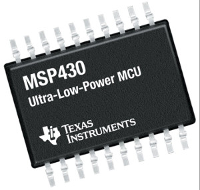Mecrisp-Across Version 0.9a¶
Released January 2020, this is Matthias’s Christmas present to those of us who love Mecrisp-Stellaris and the MSP430.
~~~~~ Mecrisp-Across is now ported to run on the STM32F4 Discovery board !!! ~~~~~
Quick Mecrisp-Across Recap¶
It’s like a interactive Gcc with Gdb.
The peripherals are pre-defined, no need for memory maps, SVD’s, include or header files. They are ready to code for right away.
It generates a highly optomised bootable binary image for the target, including vector configs
There is no Forth kernel pre-install or bootloader necessary in the target hardware, it runs on a totally blank mcu.
The HOST compiler is GPL3 licensed, your target binary image license is gpl unencumbered. License it how you wish.
- Mecrisp-Across is possibly one of the strongest optimizing Forth cross compilers you have ever seen. Out of the box, it does:
Constant folding
Register allocation for both data and return stack
Dead code elimination (imagine a constant feed into case)
Register allocation across control structures
Determination which definitions are in use,
Automatic inlining of definitions used one time only
Interrupt handler framing depending on register usage
I’m confused, can you explain how Mecrisp-Across works again ?
Quick MSP430 Notes¶
If you haven’t used the MSP430 family before, this is NOT some obsolete 16 bit MCU, in fact it’s quite unique and has stood the test of time!
Why ?
Texas Instruments have some of the very best digital and analog engineers in the world. They designed and manufactured leading edge electronics components that were used in the Apollo spacecraft that landed on the Moon in 1969. Ti are the absolute masters of power control and measurement devices with many patents.
MSP430 characteristics include:
Probably the lowest of low power usage in MCU’s available today
Low supply voltage range, 0.9 to 3.6v
Five power saving modes
16 bit RISC architecture
16 bit Sigma-Delta A/D converter
Spy-by Wire and JTAG interface
Self contained including clocks
Hundreds of models with a huge variety of tightly integrated peripherals, making low power usage often just one command
ISA that’s a pleasure to code for, completely orthogonal like the obsolete Motorola 6800 series was.
Matthias wrote a MSP430 bootable ‘Blinky’ that assembles to only 14 Bytes! This is impossible on any Cortex-M device as our best efforts are double that at 28 Bytes.
Terms¶
Term |
Description |
|---|---|
HOST |
STM32F4 Discovery Board or equivalent with STM32F407 MCU. It runs Mecrisp-Across V-0.9 |
TARGET |
MSP430xxxx 16 bit, highly integrated, lowest power MCU. Beautiful ISA. 300 models available right now on arrow.com |
Advantages of Mecrisp-Across V0.9a ?¶
Runs on the STM32F407 MCU as used in the F4 Discovery Board by STI
The STM32F407 MCU handles everything from target JTAG control, to target flashing. No special target flashing board is required
Runs at the Host full speed of 168 MHz (faster target emulation)
Only 4 wires, including power connect to the MSP430 Target
Uses USB for the HOST Forth terminal. It’s the fastest terminal possible.
Has built in USB handshaking which means no end of line delays. Forth project files upload almost instantly.
Note
The binary image for the demo blinky is 36 Bytes total, thats ALL !
STM32F407 Discovery Board¶
The STM32F4 Discovery board (STM32F407) must be flashed with the following binary from the new release.
mecrisp-stellaris-stm32f407-with-mecrisp-across.bin
This is available for download at:
https://sourceforge.net/projects/mecrisp/files/mecrisp-across-0.9-experimental.tar.gz
Warning
Don’t get the “Nucleo Board” as it has a different MCU !
Warning
Check if your F4 Discovery Board has a FAULTY MCU
Availability in 2022 ?¶
As of 4Jan2022, I can’t see any STM32F407 Discovery Boards for sale at reputable suppliers such as arrow.com.
Chinese STM43F4 Discovery Board Clone¶
Genuine board on the left, Chinese board on the right. Spot the differences ?
Separate color leds
No board revision i.e. “MB997C” printed on board
No STMicro URL printed on board
Both push buttons identical black color
Pin Headers are unassembled
No STI Logo/trademark
Different chip between push buttons
Note
I’m not saying the Chinese board is “no good”, it may even be better then the genuine unit, I just have no information on it as yet.
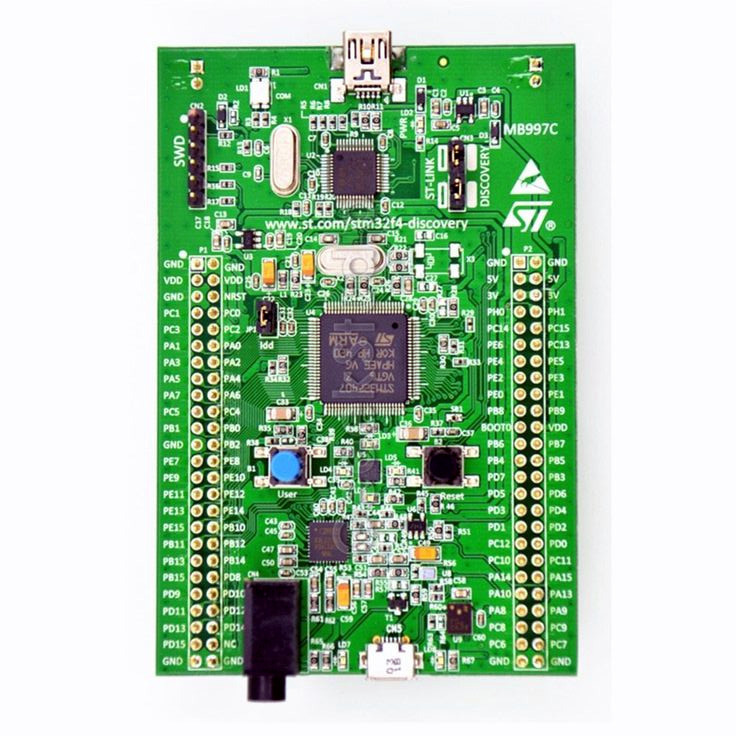
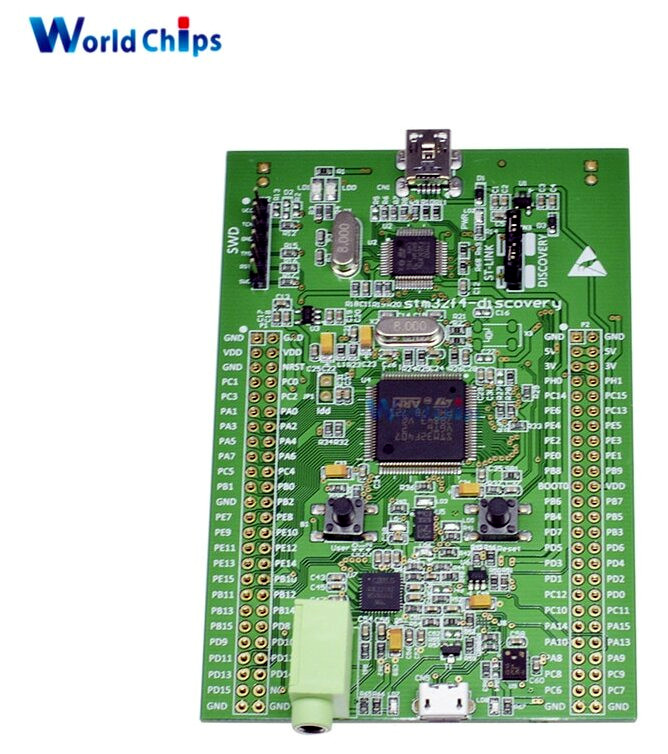
Be aware that Gigadevices make a licensed second source STM32F407 named GD32F407 which I assume will work fine.
STM32F4 Disco Alternatives¶
Chinese STM32F4 Disco Boards
Any STM32F407 board used with a with a external SWD/STlink dongle if the board doesn’t have one.
External SWD/STlink dongle¶
There are many alternatives if you don’t have a Discovery board.
Chinese $5 Clone¶
They use the CKS32F103C8T6, and the genuine STMico firmware. They work perfectly as far as I know.
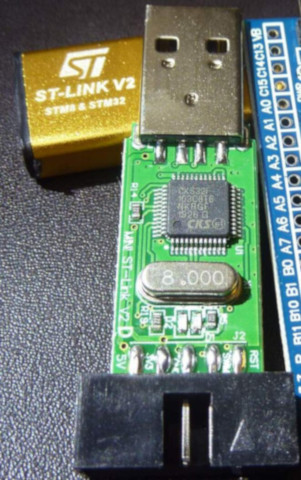
Blue Pill with Blackmagic Probe¶
Use your Blue Pill board (or equivalent) as a SWD/STlink dongle, I do and they work fine.
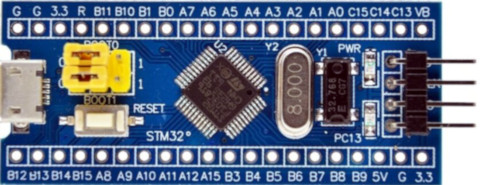
https://mecrisp-stellaris-folkdoc.sourceforge.io/projects/bluepill-bmp/README.html
Target¶
MSP430G2201 Used In This Project¶
The bottom of the Texas Instruments MSP430xxx range, the MSP430G2201 is a perfect MCU for simple projects, no extra unnecessary hardware and you can learn the entire chip inside and out within a day.
Want the lowest power use? Not having to write extra code to disable unwanted peripherals is great.
At the middle of the ‘Great MCU Shortage’, 6Sep2021 I paid $0.40 AUD each (including shipping) for 150 off MSP430G2201RSA16R. They are a 16 pin VQFN package with 2KB flash and a single timer. It works perfectly with Mecrisp-Across.
I should have purchased more of them as they’re now $1.3933 AUD (3Jan2022), an increase of 350%. At least Arrow.com have 500 parts in stock right now. If you think this is terrible and will wait for the prices to go back down, good luck, it may be years away. The STM32F051 chips I paid $0.56 USD for in 2014 are $12.60 USD each right now, IF you can find any.
https://www.arrow.com/en/products/msp430g2201irsa16r/texas-instruments
Warning
the MSP430G2201IRSA16R I received were obviously ancient stock because the pins needed cleaning before I could solder them. This involves gently rubbing the pins on a sheet of paper to remove the oxidisation, so it’s no big deal.
Other MSP430 Chips¶
Any other MSP430 MCU can be used and there is a LOT of variation in peripherals, memory size and types, operating voltage and packages, so I suggest researching carefully before buying.
F4 Disco Power and Target Connections¶
The power and flashing is done via the USB connector at the SWD STLINK programmer/interface connector.
The USB ‘terminal’ is connected by the micro USB connector next to the big black audio socket.
Target connections use only 4 wires as described below.
Target Connection Table¶
The STM32F4 Discovery board must be connected to the MSP430G2201IRSA16R target ($0.40 AUD) as per this Connection Table, though other MSP430 models can easily be used; just alter the pin numbers etc.
Pins |
Test Clip Color |
MSP430 Target Pin |
|---|---|---|
PC-8 |
BLUE |
RST - pin 9 |
PC-9 |
YELLOW |
TEST - pin 10 |
GND |
BLACK |
GND - pin 14 |
3.3V |
RED |
VCC - pin 16 |
Target Footprint and test pcb¶
For the MSP430G2201IRSA16 model.
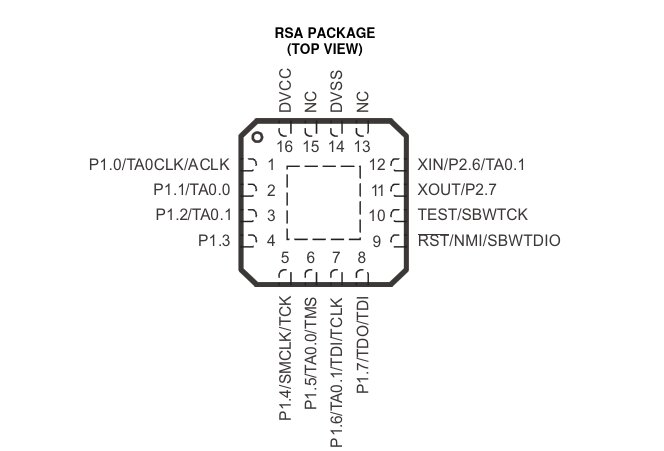
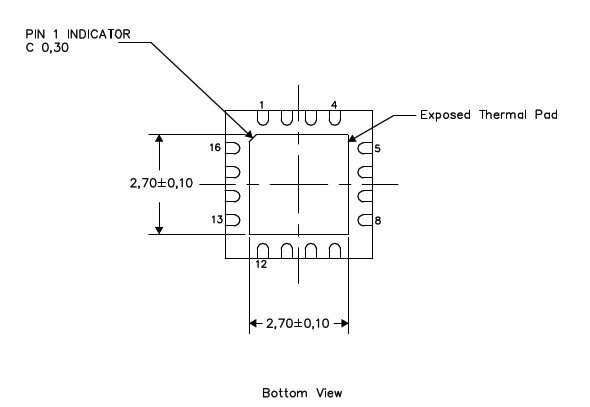
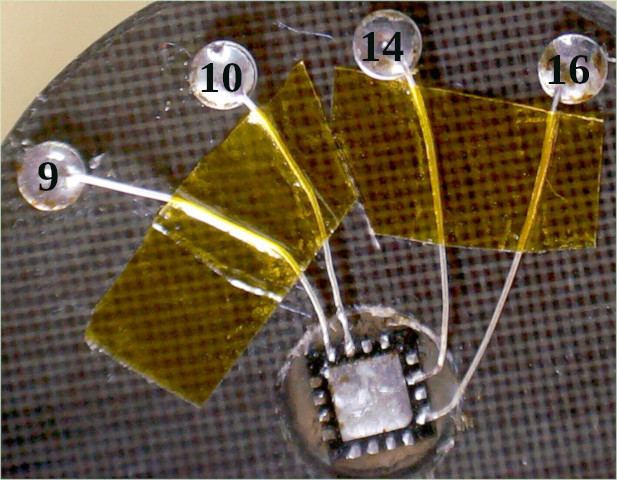
Target Connected To Host¶
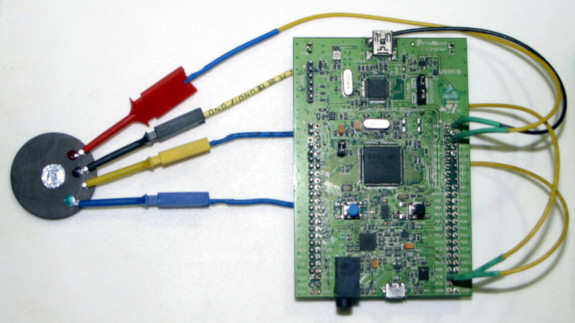
My Terminal Config¶
For FreeBSD, Linux will have a different device.
xterm -e picocom -b 115200 /dev/cuaU1 --hangup --imap lfcrlf,crcrlf --omap delbs,crlf --send-cmd "cat" &
The awesome feature here is that because it’s using the USB driver written by Jan Bramcamp the speed seems instant, what I mean is that this is the FASTEST Forth terminal you have ever seen and as handshaking is built in, so are the source uploads.
Test Blinky¶
This compiled to only 36 bytes!
Source¶
: delay ( -- )
65535 0 do loop
;
: minblink ( -- )
1 p1dir c!
begin
1 p1out cxor! delay
again
;
Terminal¶
+jtag
Chip detected: F201 ok.
target
Note
Picocom: <Ctrl+AS>, then select file to upload … in this case, blinky1.fs
*** file: blinky1.fs
$ cat blinky1.fs
*** exit status: 0 ***
: delay ( -- ) ok.
65535 0 do loop ok.
; ok.
ok.
: minblink ( -- ) ok.
1 p1dir c! ok.
begin ok.
1 p1out cxor! delay ok.
again ok.
; ok.
See¶
Note, disassembly at this stage is in Forth!
see delay
: delay
00007784 : 0000 : $0000FFFF
00007790 : 0000 : $00000000
0000779C : 0000 : swap
000077A8 : 0000 : >r
000077B4 : 0000 : >r
000077C0 : 0000 : <--
000077F8 : 0000 : r>
00007804 : 0000 : $00000001
00007810 : 0000 : +
0000781C : 0000 : r@
00007828 : 0000 : >r
00007834 : 0000 : dup
00007840 : 0000 : r>
0000784C : 0000 : swap
00007858 : 0000 : >r
00007864 : 0000 : =
00007870 : 0000 : 0-Branch $000077C0
0000787C : 0000 : r>
00007888 : 0000 : drop
00007894 : 0000 : r>
000078A0 : 0000 : drop
000078AC : 0000 : ;
ok.
see minblink
: minblink
000078F8 : 0000 : $00000001
00007904 : 0000 : $00000022
00007910 : 0000 : c!
0000791C : 0000 : <--
00007954 : 0000 : $00000001
00007960 : 0000 : $00000021
0000796C : 0000 : cxor!
00007978 : 0000 : delay
00007984 : 0000 : Branch $0000791C
00007990 : 0000 : ;
ok.
Flash Target¶
Select host mode¶
host
Name Init Word (miniblink), crosscompile and run¶
$FFFE vector minblink crosscompile flashtarget -jtag run
Output With Stats¶
Memory usage in Flash without vector table 36 bytes.
Memory usage in RAM without stacks 0 bytes.
Required passes: 1
Disassembly¶
Note: disassembly is now machine code and of entire target binary image.
disimage
F800: 40B2 mov.w #5A80h, &120h
F802: 5A80
F804: 0120
F806: 4031 mov.w #280h, r1
F808: 0280
F80A: 4034 mov.w #260h, r4
F80C: 0260
F80E: 43D2 mov.b #1h, &22h
F810: 0022
F812: E3D2 xor.b #1h, &21h
F814: 0021
F816: 4307 mov.w #0h, r7
F818: 4338 mov.w #FFFFh, r8
F81A: 5317 add.w #1h, r7
F81C: 9807 cmp.w r8, r7
F81E: 23FD jnz F81A
F820: 3FF8 jmp F812
F822: 3FFF jmp F822
Memory usage in Flash without vector table 36 bytes.
Memory usage in RAM without stacks 0 bytes.
Hexdump¶
Then paste into a file on your pc to use later if flashing blank targets with a Ti Programmer, tho it’s easier to do with Mecrisp-Access.
hexdump
:10F80000B240805A20013140800234406002D2432D
:10F810002200D2E321000743384317530798FD2302
:10F82000F83FFF3FFFFFFFFFFFFFFFFFFFFFFFFF6F
:10FFF000FFFFFFFFFFFFFFFFFFFFFFFFFFFF00F817
:00000001FF
Note
Install msp430-binutils to convert hexfiles to binary
msp430-objcopy -I ihex -O binary $HEXFILE $BINARYFILE
Extras¶
One of Matthias favorites is the MSP430F2012¶
Available in TSSOP and DIP for thru hole hobbyists.
5Jan2022 @ arrow.com there are 144 parts off MSP430F2012IN available for $2.4425 USD each in minimum batch of 25 units. MCU 16-bit MSP430 RISC 2KB Flash 2.5V/3.3V 14-Pin PDIP Tube.
https://www.arrow.com/en/products/msp430f2012in/texas-instruments
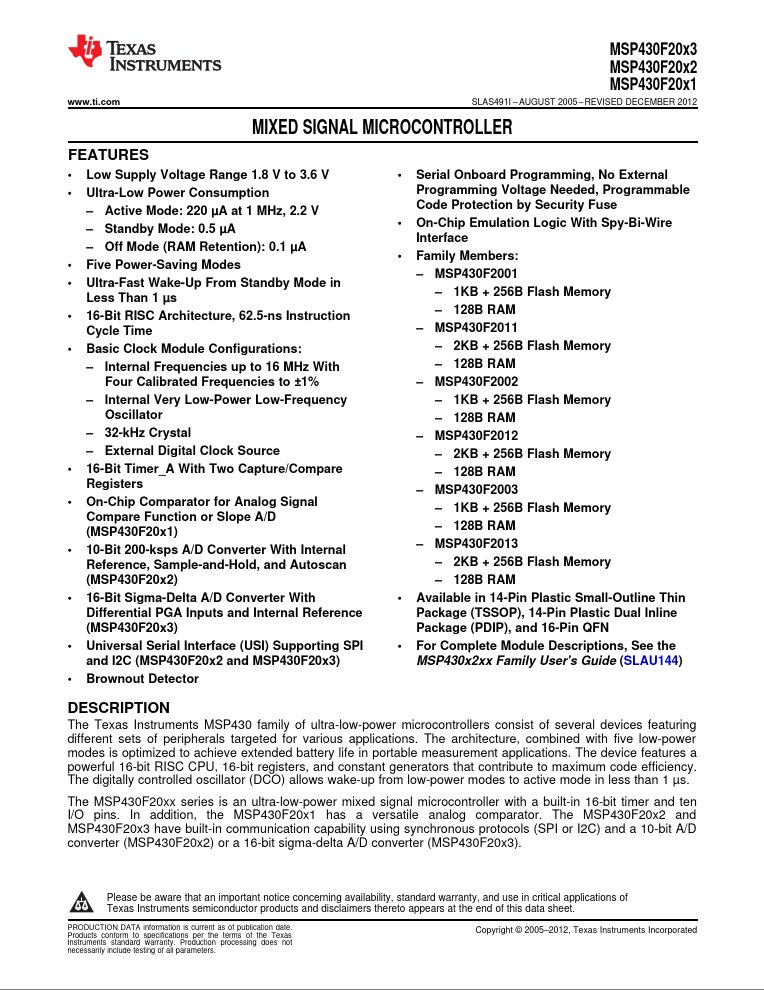
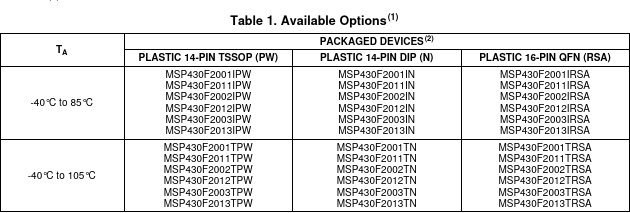
Round Pcb Construction¶
How the Roundpcb was made: https://mecrisp-stellaris-folkdoc.sourceforge.io/turret-pins.html
